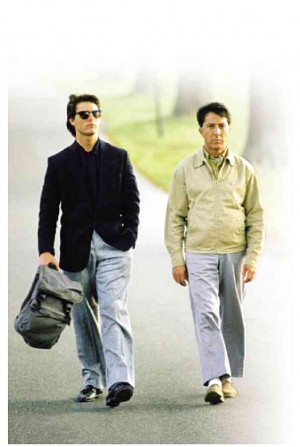When in doubt, go dramatically ‘medical’
The recent triumphs at the Oscars of Eddie Redmayne and Julianne Moore in “medical” dramas have proven the veracity of the show biz truism, “When in doubt, go ‘medical’ and play a desperately sick character!”
What is it about medical dramas that make performances in them more emotional, emphatic and potentially “awardable” than other dramatic vehicles?
First, most everybody gets sick at one time or another, or is praying for the recovery of a loved one, so what you get is…empathy—plus!
In addition, some of the illnesses depicted are extremely rare and fatal, so viewers’ feelings of fear and desperation are constantly being “played”—to the max!
On the other hand, surcease and even liberation are offered by the fact that some of the dire diseases end as being cured by a last-minute scientific discovery, so a happy ending could still be in the works!

FOR HIS ROLE as an autistic in the 1988 film “Rain Man,” Dustin Hoffman (right, with Tom Cruise in photo) won Oscar best actor.
Stars who’ve benefited from playing sick or disabled characters include Dustin Hoffman, who was rewarded with Oscar gold in 1988 for his depiction of an autistic man in “Rain Man.” The very next year, it was Daniel Day-Lewis’ turn to win an Oscar best actor trophy for his even more contortedly impressive portrayal of a man suffering from cerebral palsy in “My Left Foot.”
In 1991, the focus was on psychosis, with Anthony Hopkins’ truly terrifying depiction of a mad genius and cannibal in “The Silence of the Lambs.”
Other “medical” portrayals that have been rewarded with Oscar trophies: In 1993, Tom Hanks as an AIDS patient in “Philadelphia.” 1994, Hanks again with “Forrest Gump,” in which he portrayed a “man-child” with a nonspecific learning disability.
For his part, in 1995, Nicolas Cage played an alcoholic so rigorously and believably in “Leaving Las Vegas” that he topped the prestigious acting derby. The very next year, it was Geoffrey Rush’s turn to win in “Shine,” where his character was afflicted with mental illness.
In 1996, in “As Good as It Gets,” Jack Nicholson’s character suffered from an obsessive-compulsive disorder, more popularly known these days as a bipolar condition.
Other “long-suffering” winners: Jamie Foxx as the blind pianist, Ray Charles, in “Ray” (2004). 2009, Jeff Bridges as an alcoholic in “Crazy Heart.” In 2010, Colin Firth as a royal stutterer in “The King’s Speech.” And, in 2013, Matthew McConaughey as an AIDS patient in “Dallas Buyers Club.”
On the local performing scene, actors just love proving their thespic worth by portraying patients suffering from cerebral palsy or mental retardation, with Gerald Anderson’s stellar depiction of a young man with the mind of a child in “Budoy” as the most recent TV example.
As any number of thespic showcases on “Maalaala Mo Kaya?” and “Magpakailanman” affirm, terminal illnesses are reliable suppliers of daunting problems and crises that make for “fatal” melodrama.
However, producers and directors shouldn’t forget that the most memorable medical dramas are those that go beyond suffering and tragedy, and show patients and their doctors fighting to triumph over “terminal” adversity. Everyone involved, viewers included, learns from the shared experience, and is inspired to become—a much better person, as a result.
